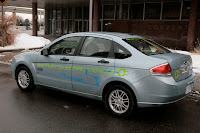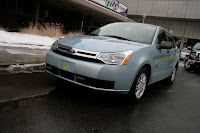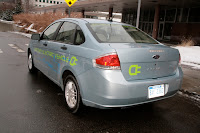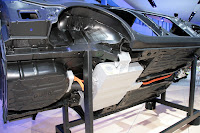
Ford announced September 2 its Focus Electric, due out next year in the U.S., will contain a lithium ion battery pack with a liquid-based thermal management system.
Ford will use for the Focus a lithium-ion battery pack which will use heated and cooled liquid to handle one of the most dreaded things in an EV: overheating batteries. The liquid will be used by the car to keep the heat level to a minimum, hence increasing both the range and life span of the pack.
Ford is still developing the car, but the prototype we drove had a 23 kilowatt-hour lithium ion pack, which makes it about the size of the air-cooled pack in the Nissan Leaf. By using active thermal management, Ford says it will maximize battery life and range and optimize charging by heating, or cooling, the pack to the best temperature before pulling juice from the grid.
The introduction of this type of electronic cooling, will extend the batteries lifespan and also help to gain the maximum performance. By keeping the cells cool the active thermal management will be able to prevent the likelihood of cracks in the electrodes. These cracks can start to effect the batteries power and reduce the charge capabilities. On initial plug-in the management system will run a precondition of the batteries before it allows charging to begin.
The Focus Electric, which will be released in the U.S. late this year and in 2012 in Europe, is one of five electrified vehicles Ford will release over the next three years. The Ford Transit Connect Electric small commercial van arrives in late 2010, followed by two next-generation hybrid electric vehicles, as well as a plug-in hybrid electric vehicle in North America in 2012 and Europe in 2013.
Source: Ford











Press Release
FORD USES INNOVATIVE LIQUID-COOLED BATTERY SYSTEM TO HELP FOCUS ELECTRIC OWNERS MAXIMIZE RANGE
- The all-new Ford Focus Electric, which debuts in late 2011 in the U.S. and 2012 in Europe, will be powered by a lithium-ion battery system that utilizes cooled and heated liquid to regulate battery temperature, extend battery life and maximize driving range
- The innovative thermal management technology helps the Focus Electric operate efficiently in a range of ambient temperatures
- Focus Electric is one of five new electrified vehicles Ford will deliver over the next three years in North America and Europe. The Focus Electric will be built at Ford's retooled Michigan Assembly Plant
Thermal management of lithium-ion battery systems is critical to the success of all-electric vehicles because extreme temperatures can affect performance, reliability, safety and durability. Ford has chosen an advanced active liquid-cooling and heating system to regulate the temperature of its lithium-ion battery packs, which are designed to operate under a range of ambient conditions.
"All-electric vehicles do not have a conventional engine on board, so it is critical we maximize the performance of the battery under various operating temperatures," said Sherif Marakby, Ford director, Electrification Program and Engineering. "Active liquid systems are more effective than air systems at regulating lithium-ion battery temperature. As a result, the active liquid system on Focus Electric will play a key role in providing our customers with the best performance possible."
The active liquid cooling and heating system also enables the Focus Electric to automatically precondition the battery pack temperature during daily recharging. When the vehicle is plugged in to the power grid, the vehicle system will be able to warm up the battery on cold days and cool it down on hot days.
The Focus Electric will be built at Ford's retooled Michigan Assembly Plant and will be available in late 2011. The vehicle will have an expected range of up to 100 miles and use no gasoline at all.
Battery thermal management in action
While air-cooling methods work well for many of today's smaller car battery systems, the larger, more complex lithium-ion battery technology powering Ford's all-electric vehicles calls for an aggressive thermal management system.
An active liquid system heats or chills a coolant before pumping it through the battery cooling system. This loop regulates temperature throughout the system against external conditions.
On hot days, chilled water absorbs heat from the batteries, dispersing it through a radiator before pumping it through the chiller again. On cold days, heated water warms the batteries, gradually bringing the system's temperature to a level that allows it to efficiently accept charge energy and provide enough discharge power for expected vehicle performance.
"Extreme temperatures impact a battery's life and performance, making it crucial to have an effective cooling and heating system to regulate temperature for these demanding applications," said Anand Sankaran, Ford executive technical leader, Energy Storage and HV Systems.
The liquid cooling system also plays a role in charging the vehicle. When the all-electric Focus is plugged in to recharge, the vehicle control system will automatically precondition the battery, if needed, to the optimal temperature before accepting charge. If the battery is already at the optimal temperature, the system will automatically accept charge and maintain an optimal temperature.
"We are working closely with our technology partners to accelerate the development of our lithium-ion battery systems to help our future EV customers get the most out of their vehicles," Marakby said. "Our goal is to build an electric vehicle that delivers on the quality and performance customers have come to expect from Ford."
Focus Electric is one of five electrified vehicles Ford will release over the next three years. In addition to the Focus Electric, the Ford Transit Connect Electric small commercial van arrives in late 2010, followed by two next-generation hybrid electric vehicles, as well as a plug-in hybrid electric vehicle in North America in 2012 and Europe in 2013.
Electrified vehicles are one part of Ford's broader strategy to offer a wide range of environmentally friendly, advanced technology solutions to improve fuel economy and lower CO2 emissions affordably for customers around the world.